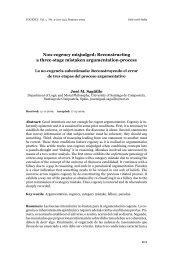Cogency v2 n2
Cogency v2 n2
Cogency v2 n2
Create successful ePaper yourself
Turn your PDF publications into a flip-book with our unique Google optimized e-Paper software.
You can’t step into the same Argument twice: Wittgenstein... / D. H. COHEN<br />
force their confusion in regards to what can and cannot be meaningfully<br />
said. In the same way that arguing with others implicitly dignifies them by<br />
acknowledging their status as reasons-responsive beings, so too arguing<br />
about something implicitly dignifies that topic as something that is arguable<br />
and worthy of argument. The subjects of arguments need to be both<br />
sufficiently meaningful, in the sense of having literal sense, to sustain sensible<br />
discourse, as well as sufficiently meaningful, in the sense of having<br />
some importance, to deserve argument. We cannot argue about nonsense<br />
and we do not argue about trivial truisms. We can ask whether the good is<br />
more or less identical than the beautiful or whether 2 + 3 is really 5, but<br />
none of those makes for a good argument. One is nonsense, the other is<br />
senseless, but those and their ilk are largely what philosophers have been<br />
arguing about (3.324, 4.003), which goes a long way towards explaining<br />
why Wittgenstein would think that arguments have no place in philosophy<br />
proper.<br />
What does this semantics entail and how does it work? Take the case of<br />
logic and logical form. Logic does not fall under the purview of any of the<br />
sciences, so if it qualified as a subject, it would be a philosophical one. The<br />
logic of the world is shown in each sensible proposition – as well in every<br />
senseless tautology. That is all a philosopher (or anyone else with respect<br />
for the boundaries of sense) has to work with. Wittgenstein admits that we<br />
can talk about these things “in a certain sense” because even though there<br />
can be no propositions about them directly, there are propositions that “make<br />
manifest” how these things work (4.122). The key here is that to we can<br />
clear up confusion about, say, the logic and status of internal and external<br />
relations not by talking about those relations themselves, but by talking about<br />
the objects that are in those logical relations. We do not have to talk about<br />
these ineffable topics to clear up confusions; we can deploy them deftly. Put<br />
another way, we have no problem talking sensibly about things or, more<br />
narrowly, objects, despite the fact that we cannot say anything intelligible<br />
about what it is to be an object or about the formal, pseudo-concept of an<br />
object. Wittgenstein’s claim is that as long as we manage to do the former<br />
well, there is no need for the latter. 5<br />
5<br />
The very striking similarities that this account of things has with what Wittgenstein<br />
says, in a very different context, about games, is no mere coincidence.<br />
25








